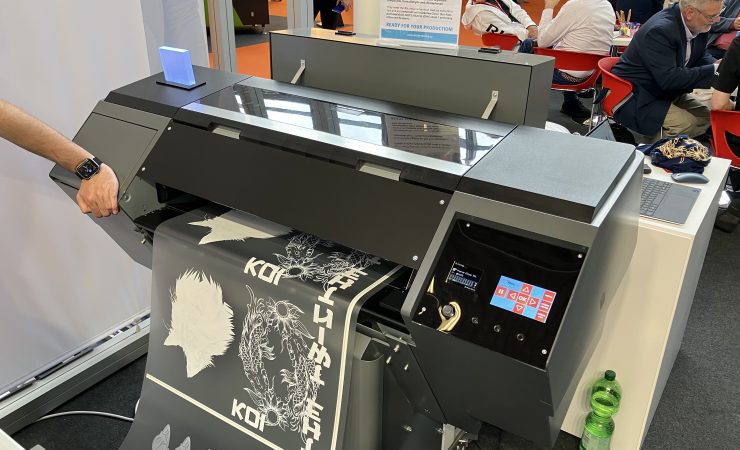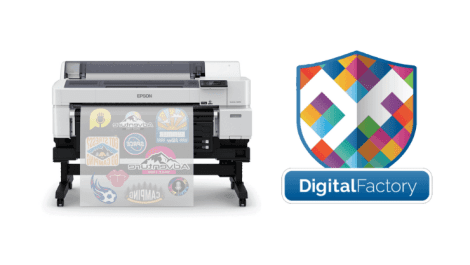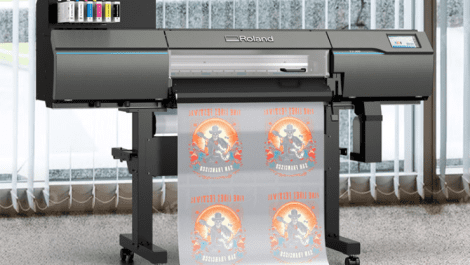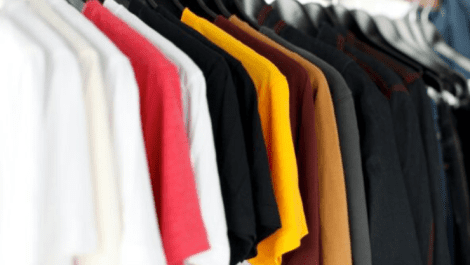Ricoh used its presence at Fespa to highlight its textile print offering, with existing and new direct-to-garment (DtG) machines and a new direct-to-film (DtF) model being previewed.
In addition to its RI1000X, a version of the RI1000 with various minor modifications, and faster RI2000 DtG printers, the company showed a ‘dark polyester printer’ (yet to be given an official product name). This unit avoids the need for pre-treating of garments by jetting its own ‘enhancer’ where required as part of the printing process. Axel Stuhlreiter, head of textile solutions at Ricoh Europe, told Digital Textile Printer that this was a low temperature process that avoided dye migration.
The system uses two separate printhead carriages to keep the pre-treatment fluid away from the colour ink printheads, as significant quantities of the former (compared to ink) are needed. Both printheads and ink are Ricoh’s own, with Mr Stuhlreiter stating that the white was particularly bright. The ‘dark poly printer’ is driven by an optimised version of the ColorGate Rip, acquired by Ricoh in 2018.
The curing process takes two minutes at 120°C and the DtG finish is said to give a better hand feel than DtF, with durability of beyond 10 wash cycles, or ‘as long as the garment lasts’, as Mr Stuhlreiter put it, noting that promotional lT-shirts were not generally of the highest quality.
The ‘Pro DTF’ machine, also yet to be formally named, will be offered in 4-, 6- and 8-colour variants, with the fully loaded version supporting CMYK plus ‘neon’ yellow, magenta, orange and green, primarily for the sportswear market. The inks have OekoTex certification and Mr Stuhlreiter said that they would also pass GOTS but ‘no one has asked yet’.
Mr Stuhlreiter explained that Ricoh has been watching DtF developments for well over two years, particularly machines from China, which various suppliers would import, modify and then resell. He said that better machines were needed and that ‘Ricoh can’t compete on price, but it’s different on quality and reliability.’
The Ricoh machine is a roll-to-roll unit that is aimed an entry-level and mid-production, able to output at around 3sqm/hr which is equivalent to 48 A4 T-shirt or similar prints. ‘Screen printers are very interested,’ said Mr Stuhlreiter, adding, ‘they are already doing screen transfers but operators are now in short supply. They may have one guy managing five carousels and could replace that with one digital unit. It’s already tested, and they are happy with the quality, the only downside is speed.’ He also notes that Ricoh has achieved a certified proof-of-process to suit brands such as Nike.
The DtF printer is supplied with a modified third-party powder/dryer unit for around €23,000 complete; Mr Stuhlreiter notes that a DtG line with pre-treatment can cost €20,000. He points out that the roll-fed unit doesn’t suit one-off production but is better suited to small volume, running off 50 similar T-shirts in one session rather than 50 different designs in a day. The cutting can be automated but for very short runs, he advises that both the RI1000 and RI2000 can adapted for sheet DtF printing, attaching the film to the platen with masking tape.
The DtF film Ricoh is offering is produced in Europe as a joint venture. Mr Stuhlreiter describes it as ‘a stable material that meets different applications such as sportwear and workwear.’





